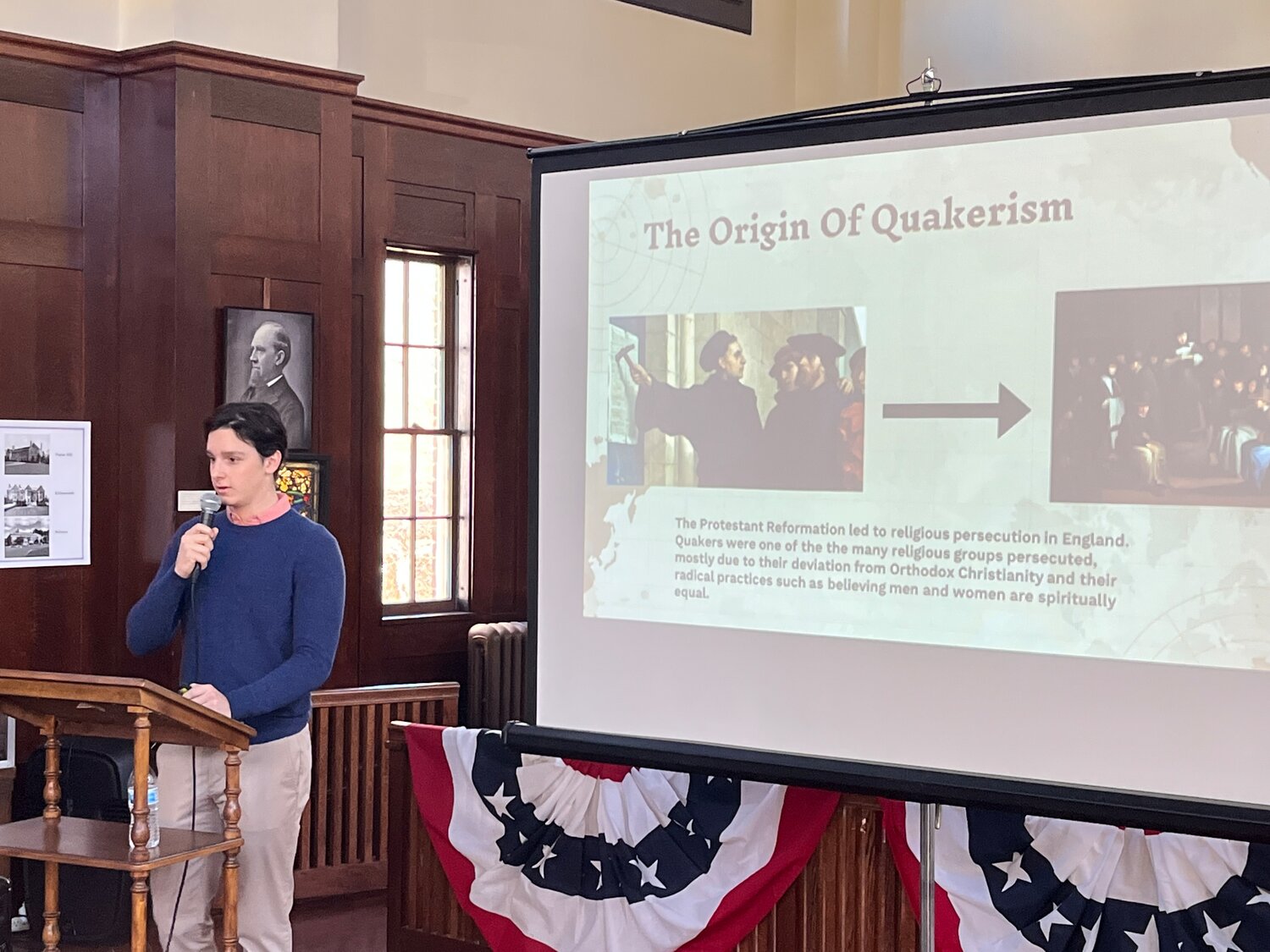Friends Academy senior explains the dual history of Quakers and abolition
The history of Quakerism has deep roots in the story of the United States, whether it be their influence on the colonial period or the key role Quakers played in the Revolutionary War, although their legacy is often overlooked by non-academics.
William Green, a senior at Friends Academy, a Quaker-run school in Locust Valley, has set out to educate history-lovers on the North Shore by giving a lecture at the North Shore Historical Museum in Glen Cove on another forgotten aspect of Quaker history: the religion’s role in the abolition of slavery.
Amy Driscoll, the director of the museum, explained that when Green reached out to her about doing the presentation she was impressed by the depth of his research and his composure. She added that the presentation, which was held on Feb. 4, was the perfect way for the museum to kick off Black History Month.
“We try to be as welcoming as we can to young scholars and new authors and burgeoning artists,” Driscoll continued. “We try to host as many people and lectures as we can, especially for those who might not normally get a public forum for their work.”
Quakers, or more properly, the Religious Society of Friends, are members of a sect of Protestantism that broke off from the Church of England in the mid-17th century, and quickly settled throughout the early British colonies. While the majority went to Pennsylvania, founded by Quaker and landowner William Penn, Green explained that numerous Quaker communities were set up on Long Island, and George Fox, the movement’s founder, even visited and preached in Oyster Bay.
However, Green pointed out, shortly after their new sect was created Quakers were already entangled with the economic tentacles of slavery, particularly in Barbados, the first Quaker community in the New World. Green explained that many early prominent Quakers, including Fox and Penn, had close ties with the slave trade and slavers on the island.
“It’s important to note that while Quakers were later at the forefront of abolitionism, slavery was still a norm in the Quaker religion, and this is particularly reflected in Barbados,” Green said. “During the 1600’s, Quakers were frequently slaveowners, and often traded slaves to the Quakers in Pennsylvania.”
Green emphasized the fact that despite their early involvement in slavery and the slave trade, numerous Quakers began speaking out against the practice of slavery quite early on. He added that in 1688 Francis Daniel Pastorius, a young German attorney and Quaker from Germantown, Pennsylvania (now part of Philadelphia) wrote the “Germantown Quaker Petition Against Slavery,” intended to raise the issue of the contradiction between slavery and the biblical golden rule: “Do unto others as you would have them do unto you.”
“(Pastorius) used this idea to expose slavery and how God does not approve of this institution,” Green said. “He also prophesied a dark future for Quakers if they did not start to free their enslaved people.”
While the local Quaker hierarchy rejected the petition, Green noted that this petition marked the first instance of Quakers speaking out against slavery. While many Quakers would continue to own and profit from enslaved people for decades, the petition marked the beginning of the abolition movement in the Society of Friends, and one of the earliest examples of abolitionist writing in history.
Green then spoke of several prominent Quakers in the early and mid-1700’s who had spoken out against slavery, most notably Benjamin Lay, who in 1738 stabbed a hollowed-out book filled with fake blood during the Quakers’ yearly meeting in Philadelphia, spraying the crowd and crying, “Thus shall God shed the blood of those persons who enslave their fellow creatures.”
Green concluded by discussing slavery on Long Island, and how despite modern tendencies to blame the South for the atrocity of bondage, it was incredibly prevalent here as well. Long Island actually had the most slaves of any northern colony, and it would not be ended until 1827.
Despite these facts, Green added that even on Long Island many Quakers were prominent abolitionists. While slavery is an indelible stain on American history, Green emphasized that the Quakers consistently and actively tried to right the wrong.






